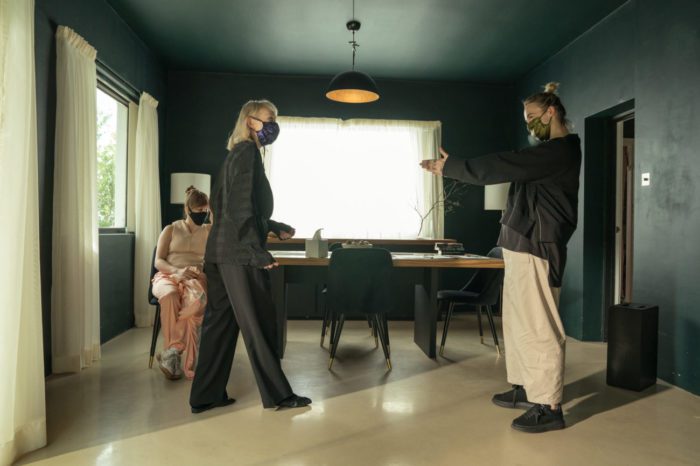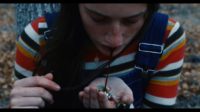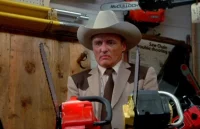A Banquet has been described as “an unsettling, thought-provoking and hyper-tense psychological thriller,” and having seen it, I couldn’t possibly disagree. The film’s director Ruth Paxton took time out of her schedule recently for me, and she was a joy to talk to.
Ruth has been known for short films until now, so I opened by asking her what was had been like moving into something bigger and how she had chosen this particular script. “So I was really hungry for it,” said Ruth. “I’ve been making short films for a long time, and the way the industry works in the UK is almost like an invisible ladder: I felt like I’d been climbing it for a long time and was really ready. But I’m a person who normally writes my work, and I’m a slow writer, so my development periods are quite long. This film just happened in a really strange way: it was a meeting with a producer called Leo [Leonara Darby], who I’d never met before, and she told me about what they had on their slate at Tea Shop, and I talked about my interests and what I was writing…and she mentioned A Banquet and she pitched it as a film that sat somewhere in between Hereditary, Take Shelter, and Rosemary’s Baby and I was immediately, ‘whew! I like those films!’ She sent it that day and I read it immediately and I was totally gripped by it for a number of reasons: it’s a great story, a great concept, and there is a number of things there that I’m preoccupied with in my own work and life. I also just loved the relationships that were painted: the horrible and lovely dynamics between mother and daughter in the film. And there were also scenes that stood out, that made me know I want to film this scene, I want to do this. And it came together really quickly with the writer, too, so I was glad about that.”
It’s interesting Ruth had mentioned she was used to working on her own scripts, so I asked what it had been like directing a film written by someone else; Justin Bull, in this case. “Really rewarding, actually,” said Ruth. “It forced me to analyze the script in a very different way: I could unpack why Justin had made certain decisions, how I was going to translate something, and whether—honestly—I felt it was truthful or not, so it was a very interrogative process. Also, Justin’s a much more prolific writer than me. He had better handling on structure; I’m sh*t at structure. I’m good with character and mood, but structure and plot are not my strong points, so I learned a lot from him as a result. We had to translate the film from an American setting to a British setting as it was originally set in a place called Concord in Massachusetts, but because of budgetary reasons, we wanted to relocate it to the UK. So I had a hand in shaping it then, and it was wonderful to put my imprint on.”

The mother-daughter dynamic Ruth had mentioned occurs in several relationships in A Banquet, which had brought Relic to mind for me. I asked Ruth whether she thought Justin Bull had written female characters well. “I think he did, definitely, but I think I enriched them. That was one of the things that I thought when I read the script: I know these relationships, I know these women, but I think I can deepen the characterization here, and add more. Justin is self-aware, knows he is a man writing about female issues and relationships, so between myself and Leo, we helped to bring in some more authenticity. But to be fair to Justin, he created great characters in the first place.”
I have to wonder whether the story might have turned out differently if the characters had not all been female. “It is interesting,” Ruth agreed. “One of the things that get commented on is that it is a female-led story and yeah, but that’s just the make-up of this film: it could be different if it had included male figures, but ultimately it’s about the generational trauma that’s passed down. For me, it was particularly interesting that the relationships presented were all mother-daughter ones, and it reminded me that the way I thought about my body and food was a result of how my Mum thought about her body and food. That was all stuff that was really familiar and exciting to me to explore.”
There were indeed many themes in A Banquet beyond trauma and food: family, grief, purpose, generation gaps, belief, class, and so on. I asked Ruth whether she saw any message in the story for her audience. “I’m conscious that there are a number of weighty themes,” agreed Ruth, “and I think that it could be overwhelming in some sense. But that’s one of the things I thought when going into it: life’s messy, we don’t endure just one f**king thing at a time. This is a family that’s in a mother f**ker storm of you know, grief, mental ill-health, what it is to be a teenager in this world, and also what it is to be a mother: these are huge things. Message-wise, I struggle, because it’s for you to decide, but I had said that I think the film does a good job of demonstrating difficult relationships at home, you know, especially between mother and daughter; and I think they’re very authentic, even though the stakes are higher in this film. I think the roots of what’s going on between Holly and Betsey are familiar and very recognizable in lots of homes (certainly mine) and I think I’ve gone off-topic!”
So I narrowed it down some more and asked whether the film had any message for me as a parent to a teenager. “Well, that’s interesting, because I’m a person with a mood disorder,” said Ruth openly, “so I’m someone who has had to learn to live with anxiety and depression, and at times that’s characterized itself as having disordered eating. My Dad is someone who has worked in mental health, so lived with insight into what was going on with me, but with my Mum, it was a very particular dynamic: she just wanted me to eat, and I wouldn’t eat, and she didn’t know what was going on there. When you’re in that situation, it’s not always about body image: it’s a mental illness and it’s a fear of what will happen if you do eat, or if you gain weight. It wasn’t about body image for me, at that time: ultimately, it’s a fear that something really bad is going to happen. Anxiety is a fear of nothing, just dread; that’s my experience, anyway. Sometimes you can identify a trigger, but ultimately, extreme chronic anxiety is about the unknown and what could be. That belief and that commitment to it is what I saw in Betsey’s experience, from the point of view of someone who isn’t religious. So that’s what I got: how frightening it can be to be disbelieved; also the horror here relates to depression and thinking that I’m going mad. This is the scariest thing I’ve experienced in my life, as opposed to monsters or supernatural entities: that sort of thing doesn’t scare me. So what I wanted to do in the film was infuse it with a sense of dread. But I know I’m circumnavigating your question because I don’t know! I’m not a parent myself, and in casting Holly it didn’t seem important at first, but as the process went on it became apparent that it would be helpful if she were a Mum: I wasn’t, so having someone with that sense of responsibility in the team and creating the character would be helpful.”

Circumnavigating the question wasn’t an issue at all: talking around it was surely insightful. In doing so, though, Ruth had brought me to my question about the casting. What first drew me to the film was the name Lindsay Duncan (who I completely fell for in Stephen Poliakoff’s Shooting the Past), and all the women gelled together perfectly as a family though. I asked Ruth how difficult it had been to find four people who formed such a good fit? “Aspects of it were challenging,” Ruth said, “while some aspects were very easy. Lindsay is a goddess, right? I love her, I’m a true fan of all her work, particularly Rome, where she plays Servilia: that was my route in with her, I rewatch it regularly. So the fact that she did it was great: we didn’t have to hunt for her. So that was one side of it. When I met Sienna [Guillory, who played Holly]—she was the only cast member who I met physically, the rest was done virtually during lockdown—she came to Edinburgh just before the first lockdown and I say that she stole the role because it was just hers; and actually in the development process, Sienna’s character in real life started to be how I saw Holly being realized, so that was a great thing to have from the outset. Then when we were looking for Betsey (because that’s who I felt should be cast next), we met Ruby [Stokes, who played Betsey’s younger sister Isabelle]. I met Ruby in an online conversation just like I’m talking to you now, but she was just spectacular: a wonderful confidence and quiet power, and that came through the screen. But I knew she wasn’t Betsey, and in a sense (I know it sounds cheesy) she just told me she was Isabelle. That’s really how it was. For such a young woman, she had such confidence and did so little: I found it incredibly impressive how little she needed to do to convey so much, you know? Her character for me is the source of much heartbreak: the horror of the film is in the scene where she has to leave. Oh! Then it took longer to find Betsey, and part of that was because I was looking for the wrong thing: I thought I knew what I wanted, I was meeting actors who had that virginal Biblical look with long hair, a bit fragile…and then I met Jess [Jessica Alexander], who is the complete antithesis of that, such confidence. She brought Betsey to set, really showed me who Betsey was, a very different version to the young woman I had in mind, and it really worked. I’m so, so pleased with the cast and how they interacted with each other. Sienna was incredibly maternal with the two young women and I think Jess (she’s now made a number of features, but at the time, she was relatively inexperienced), she was learning a lot from Sienna.”
I was very happy that so far neither of us had said much about the content of the film, but the next question might hint at it. When I received the publicity, I read that A Banquet was firmly described as an apocalyptic horror, but when I watched it, my interpretation was different. I asked Ruth how she might label the film. “I struggle with this kind of label, Alix, I really do,” said Ruth. “For me, it’s a family drama, a psychodrama. Because I knew when I went into it that although it leans into certain horror tropes, it’s not going to satisfy a certain horror audience’s hunger; it’s really not. It’s not full of jump scares or monstrous moments, and neither does it offer answers; and I think for some people it could be frustrating. For me, well I directed a drama with real people in it; I didn’t direct a horror film, but there are moments when we dip into the psychological and—with that—the surreal, so that’s kind of the crevices of our dark imaginations, which for many people can be very real. Yes, it’s a ‘psychological horror’, I think that’s probably the safest box to put it in. I agree that it’s not ‘apocalyptic’, though I guess when you get to the end it could tick that box; it’s not really the main thrust of it, for sure. But however you read it is fine.”

I generally prefer to write either a review or an interview (my own insights or the filmmaker’s), so in the case of A Banquet, the review has been covered by JP Nunez. JP was interested to find out what religious influence went into the story. Ruth isn’t the writer in this case, of course, but she had the answer: “Originally, the script was quite specific about Betsey’s beliefs and she had latched on to the teachings of a prophetess called Ellen G White, who was an American Seventh Day Adventist. I am not a religious person and found it quite hard to access the character and therefore think about how to direct them, so I encouraged Justin to make it a more ambiguous faith. Having said that, although I really don’t have any faith, I love Catholic iconography; I’m hugely inspired by Biblical classical art and the gravitas of that, the image of the Pietà and that sort of thing. And those aren’t an influence just on this work, but on much of my filmmaking. So there’s obvious references to classical Christian ideas and icons in this film, but really it’s about something that Betsey believes in and whether or not Holly is going to take a leap of faith to believe in the same thing or to believe in her cause. We didn’t talk, Jess and I, about what she believed in, but just that she was connecting with something bigger than her. If anything, maybe rooted more in the natural world, the universe itself rather than a god.
So what’s next for Ruth? “I’m trying to write—or return to—a feature I’d started on before, and it’s a big love story! It’s completely different! It’s not a sweet story, but a dark one about people in their thirties who come together, basically, as opposed to the idealistic Romeo and Juliet love of young couples; and it’s about the question of whether love really is the goal.”
A Banquet played at Toronto International Film Festival and The London Film Festival in 2021 and will be screened at Glasgow Film Festival on the 5th and 6th of March, 2022, prior to release in cinemas and digital platforms on the 11th of March.


